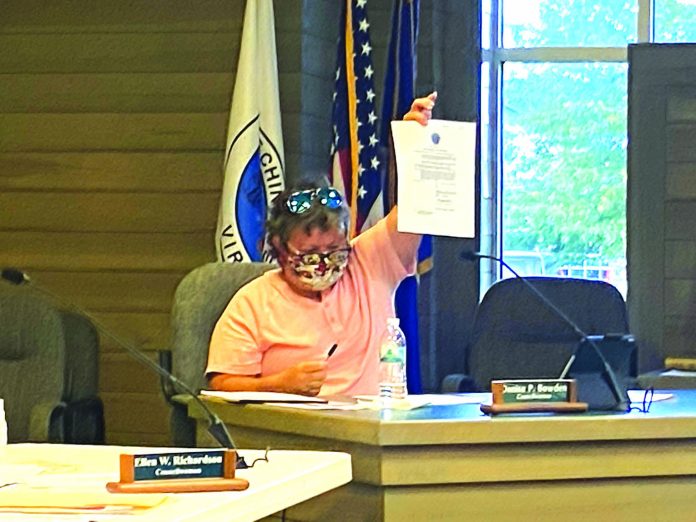
By Carol Vaughn —
The Chincoteague town council Monday approved a revised local emergency ordinance for the COVID-19 pandemic, giving the council more input into decisions.
The ordinance replaces the one the council adopted earlier this year. It took effect immediately upon the unanimous vote and can stay in effect for up to six months or until the emergency is over, if that happens before six months.
Officials during discussions at previous meetings said town charter provisions related to a local state of emergency were created for emergencies of shorter duration, such as hurricanes. In view of the ongoing nature of the pandemic, changes to the emergency ordinance were proposed to give the town council greater say in decisions related to the pandemic.
“A pandemic is a different ball game altogether,” from a hurricane, said Councilman Gene Wayne Taylor at Monday’s meeting.
Taylor at the July 6 meeting called for the town to terminate the local state of emergency, saying going out of the state of emergency would return the town “back to regular council rules. … We need to do things together; we need to make decisions together.”
At that meeting, he cited actions taken by the mayor during the state of emergency, including posting police at the bridge leading onto the island and closing down motels, saying “we should be able to do that together” as a council.
The council at that meeting voted 4-1 to exit the state of emergency, with Councilwoman Ellen Richardson voting no and Councilwoman Denise Bowden absent.
The council at its workshop session later in July voted unanimously to go back into a local state of emergency.
Mike Tolbert, town manager, said the revised ordinance “is nearly identical to the one you passed on April 13,” but includes two new sections.
Tolbert consulted with two attorneys about the wording.
The new sections state that special meetings of all or part of the town council may be called for the sole purpose of reviewing or acting on matters related to the state of emergency, with notice given to the public at the same time as to council members.
No business unrelated to the state of emergency is to be discussed or acted on at those special meetings.
A second new section says the mayor and town council “shall engage in discussions related to the state of emergency and the council may perform its required review of the mayor’s decisions” in accordance with state law at any legally called council meeting, including special meetings.
In accordance with state law, the mayor continues to have authority to make decisions related to the emergency.
The revised ordinance continues to allow electronic meetings and solicitation of public comment by written means during the pandemic where needed.
“This is straightforward, it’s simple, it gets to the point and I thought it got done what…you said you wanted to do,” Tolbert told the council.
“That totally keeps the line of not being surprised that something happens,” Taylor said.
Emergency Management Coordinator Bryan Rush said the town has spent nearly $24,000 to date on COVID-19-related expenses, mainly for cleaning.
The town still has had only 10 confirmed cases and 293 residents have been tested, he said.


